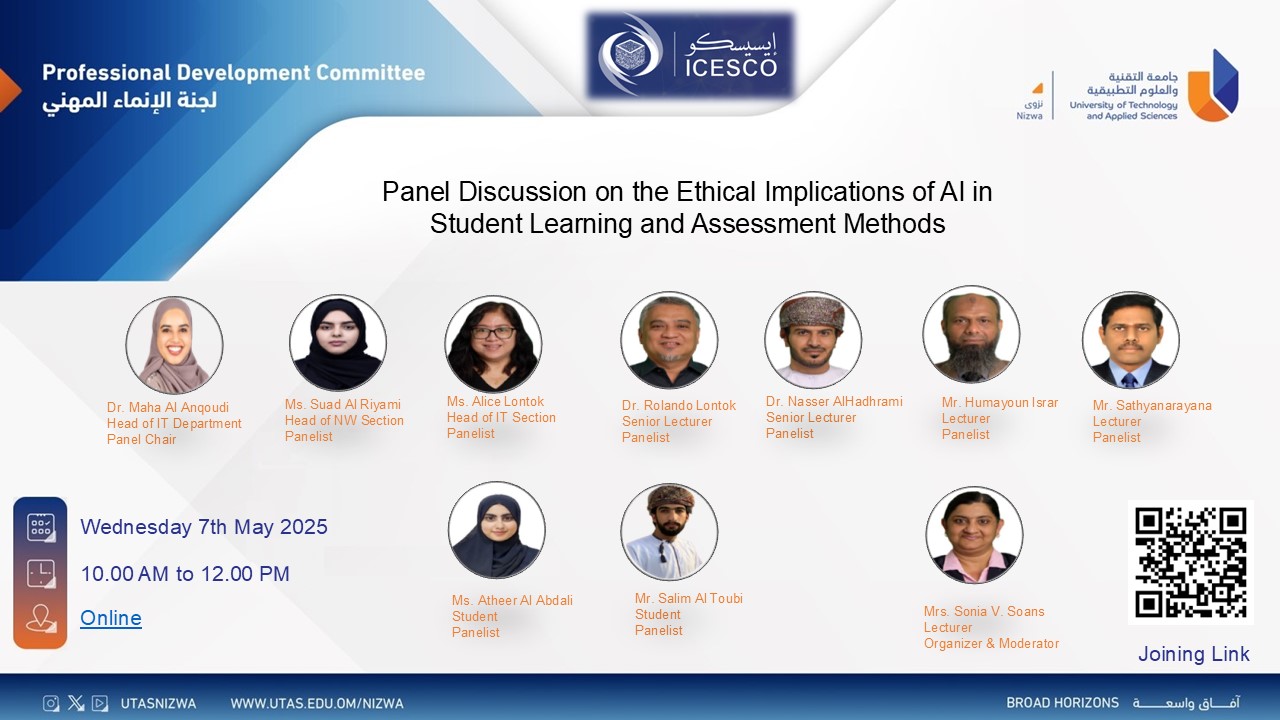Ethical Implications of AI in Student Learning and Assessment

Nizwa, May 7, 2025 – The University of Technology and Applied Sciences (UTAS), Nizwa, conducted a highly engaging and timely online panel discussion titled “Ethical Implications of AI in Student Learning and Assessment Methods” on Wednesday, May 7, 2025, from 10:00 AM to 11:30 AM. The event was organized by the Professional Development Committee (PDC) and brought together a dynamic mix of academic experts, lecturers, and students to deliberate on the evolving role of Artificial Intelligence in education.
The panel was chaired by Dr. Maha Al Anqoudi, Head of the IT Department, who opened the session with remarks on the importance of aligning technological innovation with ethical responsibility. The diverse panel featured esteemed faculty members including Ms. Suad Al Riyami, Head of Networking and Cybersecurity; Ms. Alice Lontok, Head of Software Engineering and Data Technologies; Dr. Rolando Lontok and Dr. Nasser Al Hadhrami, both Senior Lecturers with deep expertise in quality assurance and cybersecurity respectively; Mr. Sathyanarayana TV, Lecturer in AI and Machine Learning; and Mr. Humayoun Israr, Lecturer specializing in mobile app development.
Adding fresh perspectives from the student community, the panel also featured Ms. Atheer Jalil Said Al Abdali, a software engineering student and graphic designer, and Mr. Salim Al Toubi, a student specializing in Cyber and Information Security.
Moderated by Mrs. Sonia Victor Soans, an experienced IT lecturer and coordinator of Professional Development Activities at UTAS Nizwa, the session explored how AI is transforming educational processes, particularly in the areas of assessment, grading, and personalized learning. The panel sought to raise awareness and encourage critical reflection on the ethical dimensions of integrating AI into educational systems.
Discussions revolved around critical ethical issues such as data privacy, algorithmic bias, accountability, and the potential loss of human judgment in AI-driven assessments. The panelists emphasized the need for a balanced approach that ensures AI enhances fairness and equity rather than undermining them.
Key outcomes from the discussion included a set of preliminary recommendations for educators, developers, and policymakers on ethical AI deployment in education, as well as calls for greater transparency and accountability in AI systems that influence student learning outcomes
Participants praised the session for providing valuable insights into the impact of AI technologies on fairness and integrity in education. The event marked a significant step forward in UTAS Nizwa’s ongoing efforts to prepare its academic community for the ethical challenges posed by emerging technologies in education.
Writeup by Mrs. Sonia Victor Soans
362